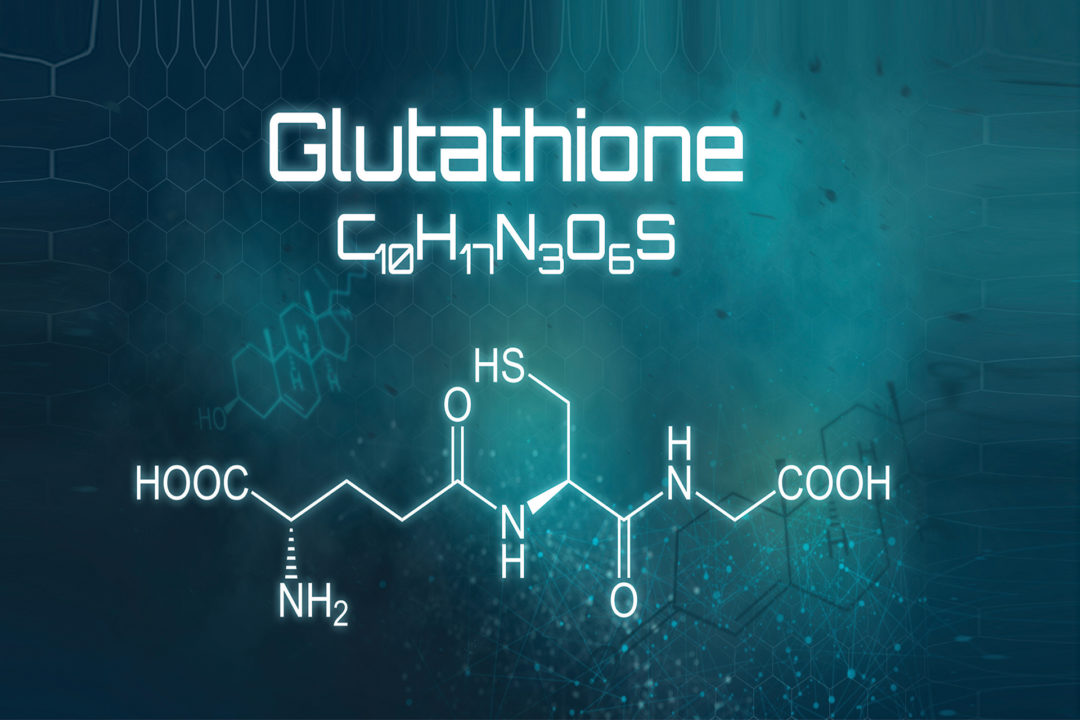Researchers say GSH works to protect cells and mitochondria from oxidative damage, and is needed for “cleansing, energy utilization, reduction of aging associated diseases, elimination of toxins from the cells, and protection from the damaging effects of radiation, chemicals, and environmental pollutants” (1).
The benefits of GSH are plentiful enough on their own, but what makes the antioxidant so masterful is its aptitude to enhance the performance of other antioxidants, like vitamins C and E, alpha-lipoic acid, and CoQ10. The protection GSH provides from free radicals and oxidative stress makes it beneficial for a variety of health issues. Plus by eliminating free radicals, glutathione helps prevent premature skin aging (1), and research in Clinical, Cosmetic and Investigational Dermatology found that Setria Glutathione (a branded ingredient from Kyowa Hakko) taken orally in doses of 250mg per day may decrease melanin production (2). GSH is also essential to brain function, making it a new option to explore in cognitive disorders like Alzheimer’s (1).
Glutathione shortages—and solutions
Many of the toxins we come into contact with on a daily basis are synthetic chemicals that aren’t supposed to be in our bodies or our environment. This is where GSH comes in: It acts as our body’s natural detox agent, helping to trap free radicals and toxins in your body so they can be excreted. However, for many of us, our reality is that our GSH levels are low. As Mark Hyman, M.D., writes in a post on his blog titled “Essential Glutathione: The Mother of All Antioxidants,” poor diet, pollution, toxins, medications, stress, trauma, aging, infections and radiation all deplete the body’s GSH stores (3). And as a result, many of us absorbing toxins at a rate that exceeds our body’s natural purging capabilities.Complicating matters: While there are genes (such as GSTM1) that produce enzymes that facilitate the creation and recycling of GSH throughout the body, these genes are impaired in some people. “We humans evolved in a time before the 80,000 toxic industrial chemicals found in our environment today were introduced into our world,” Dr. Hyman wrote. “That is why most people survived with the basic version of the genetic detoxification software encoded in our DNA, which is mediocre at ridding the body of toxins…Because most of us didn’t require additional detoxification software, almost half of the population now has a limited capacity to get rid of toxins” (3).
Studies have shown a correlation between decreased GSH levels and disease. Dr. Hyman states that nearly all of his very sick patients have decreased GSH levels as a result of missing GSTM1 function. According to Kellyann Petrucci, M.D., “when your body can’t make enough glutathione to fight free radicals and cart off toxins, the results can be devastating. You’ll age faster, your DNA will take more ‘hits,’ and you’ll be at higher risk for illnesses including cancer, diabetes, Alzheimer’s, and heart disease” (4).
The good news is that we can help maintain proper glutathione levels by eating a healthy diet and exercising (4). Dr. Kellyann encourages eating a diet high in sulfur-rich foods like broccoli, Brussel sprouts, and cabbage, as well as drinking bone broth, which is rich in glycine—one of the building blocks of glutathione.
In terms of supplements, historically there had been scientific uncertainty about GSH absorption, but newer research suggests supplements can be of benefit. The topic was discussed in a Vitamin Connection column by Richard Passwater, Ph.D., and glutathione researcher John P. Richie, Jr., Ph.D., Professor of Public Health Sciences and Pharmacology at Penn State College of Medicine (5). “Supplementation is an effective way to help maintain optimal levels of GSH in our cells and tissues,” Dr. Richie said. “To some extent, both GSH precursors as well as GSH itself can be effective.” As he explained, research suggests that “oral GSH supplementation can be an effective means of increasing the body’s stores of GSH. As a result, GSH supplementation in the long run may prove to be an effective means of reducing levels of chronic oxidative stress and its related disorders and diseases.”
For precursors, Dr. Kellyann suggests milk thistle, which can promote glutathione synthesis, as well as N-acetylcysteine (NAC), folate, and vitamins B6 and B12, which aid in methylation—a crucial process in maintaining glutathione levels (4).WF
References
- L. Sarvananda and Amal D. Premarathna, "Pharmaceutical and Medicinal Properties of Glutathione: An Overview," Mintage Journal of Pharmaceutical & Medicinal Sciences, 8(3), 21-26(2019). http://www.mjpms.in/index.php/mjpms/article/view/465/347
- WholeFoods Magazine Staff, "Kyowa Hakko USA Announces GRAS Self-Affirmation for Setria Glutathione," WholeFoodsMagazine.com. Posted 2/12/18. Accessed 10/1/19. https://wholefoodsmagazine.com/news/main-news/kyowa-hakko-usa-announces-gras-self-affirmation-setria-glutathione/
- Mark Hyman, "Essential Glutathione: The Mother of All Antioxidants," DrHyman.com. Posted 5/19/10. Accessed 10/1/19. https://drhyman.com/blog/2010/05/19/glutathione-the-mother-of-all-antioxidants/
- Kellyann Petrucci, "What Glutathione Does and 12 Ways to Boost Your Levels," DrKellyann.com. Posted 9/19/17. Accessed 10/1/19. https://drkellyann.com/blogs/news/12-ways-to-raise-your-glutathione-levels
- Richard Passwater, "Longer Lifespans and Better Health with Glutathione: Taking the Confusion Out of the Master Antioxidant," WholeFoods Magazine. Posted 9/3/15. Accessed 10/1/19. https://wholefoodsmagazine.com/columns/vitamin-connection/longer-lifespans-and-better-health-glutathione-taking-confusion-out-maste/









